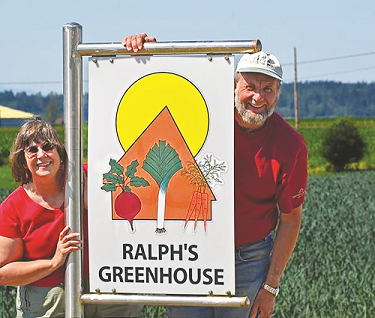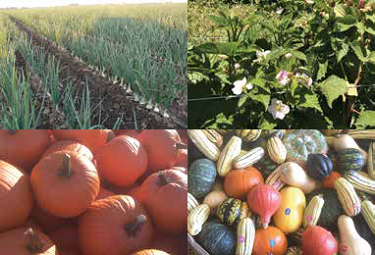Farmer Spotlights
It’s that time of year again when small-scale Washington farmers are hard at work harvesting their coldweather
crops, working overtime to provide us with freshly-plicked local and organic produce.
Ralph's Greenhouse - Mount Vernon, Washington
In the early 1950s, Ralph de Vries and his family moved from the Netherlands to continue their dairy farm operation in the fertile Skagit River Valley. After 20 successful years in the dairy industry, Ralph retired and set up a small garden as a hobby on the side. What was meant to be a manageable retirement project quickly turned into a growing organic farm.
In 1988, Ralph’s son, Ray, took over the operation, staying steadfast to his father’s farming methods and achieving organic certification the first year Washington began offering the organic program. Today, over 30 years later and with a couple hundred more acres to plow, Ray and his team continue to carry on his father’s “accidental” legacy.
Ray’s main cash crop is organic leeks, which he sells to markets all over the U.S. He also grows brightly colored carrots and beets, as well as cabbage, chard and kale. Ray credits his bountiful turnouts to the rich and nutrient-packed soil his father worked hard to maintain. To preserve soil fertility, Ralph’s Greenhouse takes advantage of composting with leftover produce and manure from the dairy farm, cover crops during off seasons and regular crop rotation to support microbe diversity.
Ray believes in the importance of upholding the vitality of the soil for future farming generations.
Inaba Produce Farms - Wapato, Washington
When Lon’s grandfather, Shukichi Inaba, emigrated to Washington from Japan in 1907, it was against federal law for Japanese immigrants to own land. So Shukichi leased 120 acres from the Yakima Indian Reservation, transforming it from expansive sagebrush to luscious crop fields; no simple feat for a struggling immigrant family. Though the Inabas had just settled down and planted their roots, a new federal regulation was passed that restricted Japanese immigrants from even leasing land.
Forced to move around as sharecroppers, the Inabas still persevered. It wasn’t until their American-born family members (natural-born citizens) were legally old enough that they could lease land of their own. Once again, they had to start from scratch, but continued to grow and prosper as a produce farm.
After the bombing of Pearl Harbor in 1941, everything changed. The Inabas were immediately rounded up and sent to an internment camp stationed inland, forfeiting their dreams, yet again, and losing everything they had worked so hard to build.
A decade later, the Inabas returned to the Yakima Valley to finally claim a piece of land they could rightfully call their own. Though Shukichi and his son Ken (Lon’s dad) have since passed, Inaba Produce Farm has become a successful and thriving organic production, covering over 1,500 acres to date, providing bounties of asparagus, zucchini, bell peppers and more to local retailers and farmers markets.












